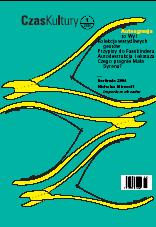Autodestrukcja i ekstaza
Self-destruction and Ecstasy
Author(s): Maciej MichalskiSubject(s): Fine Arts / Performing Arts
Published by: Stowarzyszenie Czasu Kultury
Keywords: Mystical discovery of God by women between the 12th and the 14th century; Self-destruction as an opening to ecstasy which enables observing the Creator; A dissonance between the psychological and psychiatric evaluation of the mystics’ masochism and the en
Summary/Abstract: Can the deep desire of being close to God be associated with physical pain? The intriguing history of Christianity seems to provide a positive answer to this question. In late medieval and early modern times (12th-14th century) both male and female mystics experienced direct contact with the Creator by means of inflicting strong corporal pain upon themselves. Maciej Michalski notices that contemporary literature declared that only an ecstatic state resulting form torturing one’s body could lead to observing God and talking to Him. It is interesting that this highly approved mystical dimension was encountered by simple women. The patriarchal Church had to somehow deal with the fact that it was not the theologically and philosophically educated men but the lowly women who were granted with this celestial honour. The female mystics put their bodies to tests which ordinary mortals could not endure. This included whipping, fasting, sleeplessness and diseases, all aimed at following the martyrdom of Jesus Christ. For them their suffering did not entail the then popular duality between the necessity of depreciating the body and elevating the soul. They perceived it as a beautiful experience of unexpressed happiness with God Himself. Today the behaviour of the female mystics is seen as self-destructive and would definitely require psychological and psychiatric intervention. But such masochistic actions escape the notions of modern times which perceive them as completely inappropriate. In those days these women were regarded with great esteem. They ceased to be ordinary women subjected to the patriarchal social order. Instead they obtained an aura for which they were revered and which gave them a strong position in the contemporary society.
Journal: Czas Kultury
- Issue Year: 2004
- Issue No: 01
- Page Range: 12-17
- Page Count: 6
- Language: Polish
- Content File-PDF

